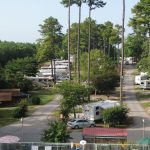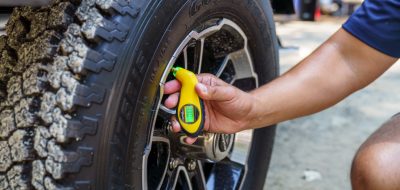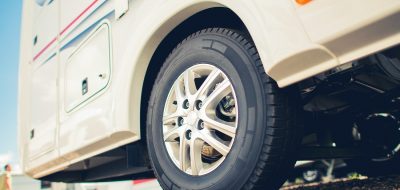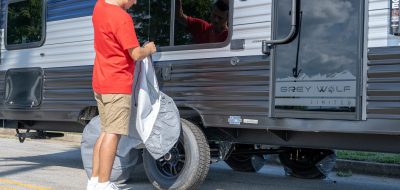 Hi, everyone!
Hi, everyone!
I hope your New Year is progressing well! As the weather starts to warm up a little here in East Texas, I’m thinking about the upcoming RV season. I hope you are, too! This month, we’ll talk about tires, batteries, lifestyle concerns, brakes and bears! Remember to send your RVing questions to [email protected].
Mark,
I just purchased a 32′ motorhome that has two 6-volt batteries wired in series. I would like to add another two or four batteries to a compartment near the original location. Does this compartment need to be vented and, if so, how would I vent it? My plan is to eventually add an inverter and a couple of solar panels so that the microwave and TV can operate off the batteries. Would I have to move the two existing batteries to the new location or can I keep them in their original place (under the entrance stairs)? Thanks, Alden
Hi, Alden:
As long as the new compartment is close, within a few feet, adding the additional batteries should not be a problem. Any further away and you start to have issues with voltage loss across the cables used to interconnect the two battery banks. If the new compartment is too far away, you will need to move the original batteries to the new location to keep them all together. Use large-gauge wire for all connections, especially if you plan to run a 1500W or larger capacity inverter. Four-gauge battery cable or welding cable would probably be a minimum size; bigger is better. The inverter installation manual will specify minimum wire gauges. Be sure to route the cables safely where they cannot rub against any edges, and consider installing one or more large- capacity fuses to protect the longer cable runs. Yes, the new battery compartment must be vented to the outside of the RV to prevent the accumulation of potentially explosive hydrogen gas around the batteries. At least two vents will be needed, and they can be installed in the compartment door. A few square inches each will be big enough, but again, bigger is better up to a point. You can get creative and use prefab soffit or eave vents like those used on buildings. Make sure that the compartment is isolated from the living space so fumes can’t get inside. All the batteries must be tied down to prevent them from shifting while you travel. Yes, it’s a big project, so if it sounds like more than you want to take on, many RV repair shops are equipped to do this kind of work.
Mark,
Being a 69-yr-old widow with no mechanical abilities (and hampered by arthritis if I were able), my hopes of owning a class-B unit and taking an extended trip, maybe turning in to full-timing, tend to turn into pure nerves when I read all the things one must do to manage, maintain and repair an RV in your column. (My husband and I intended to become snowbirds in a 5th-wheel before his untimely death, and I am reluctant to let go of this dream. HE was the handy one!) Do you agree that I would probably find this to be too stressful, or are there ways to minimize stress levels? For instance, buying a good insurance plan for road service seems iffy if you are 200 miles from a service on a Saturday afternoon driving across southern Utah. And so many “repairs” involve “trying this;” if that doesn’t work, “try this,” etc. Can a woman depend on service departments to be so well versed? Might I be sitting alongside a road for days waiting for help? Would buying a couple books cover the gamut of “what to do when?” Can everything that needs to be done to an RV be done by a service department? Would a person be much better off buying new to avoid problems? Thanks for your time and advice. Penny
Hi, Penny,
You know, life is full of risks and challenges. What if your car broke down tomorrow, or a pipe burst in your home and you had to move out while repairs were done? Worrying about such things really doesn’t help much. You just have to deal with life’s challenges as they arise and keep moving forward. The RV lifestyle is a wonderful way to live, but like any way of life, there will be some bumps in the road. Buying a newer RV, maintaining it properly and carrying good insurance coverage and road service can help reduce the worries about breakdowns and travel-related difficulties. A good road service provider will generally be able to get help to you within a few hours, even if it is a weekend, after hours or your location is somewhat remote. The majority of service personnel at RV repair centers are knowledgeable and honest. Sure, there are some exceptions, but for the most part they are good folks. A lot of single women travel extensively in RVs. Consider joining one of the solo RV groups, like Loners on Wheels (www.lonersonwheels.com) or the Escapees SOLOS group (www.escapees.com/solos) and talk with some of the folks who are out there doing it. Knowing that others are successfully enjoying single life on the road may help calm some of those worries. Plus, RVing is a choice: If you try it and decide that it really isn’t for you, you can choose another path. If you are sure that this is something that you really want to do yourself and not just something that you and your husband had “planned to do,” then don’t let those worries stop you from living your dream. A good friend once told me that when we are ready to depart from this world, the things that we regret most are not the things we did but the things we didn’t do.
Mark,
All RV units list tire pressures but do not list what the temperature should be when the pressure is read. I have a TPMS (Tire Pressure Monitoring System) on my unit, and if I air the tires up at 90 degrees, when the temperature drops to 30-40 degrees, the tire pressure drops by 6-8 psi. This causes my TPMS to signal a slow leak. Is there an optimal temperature for measuring tire pressure? Thanks, Don
Hi, Don:
Tire pressures must always be checked when the tire is “cold” (not driven on in eight hours or more). The pressure should be adjusted to give the correct reading at the current ambient air temperature. As you travel, the temperature of the air in the tire increases, causing the pressure to climb. This is normal, and you should never adjust tire pressure on a “hot” tire. When a cold snap comes in or you have moved to a colder climate zone, you should set tire pressures to the correct reading at the temperature where you are. If you then travel to a warmer spot or the temperature warms back up, you may need to let some air out to get the pressure back where it belongs. The key is, check and set pressure each day before you drive, and make the adjustments at that time to match the ambient temperature where you are. At times, when there are significant changes in temperature, your TPMS may give you a false leak indication. You might want to check with the manufacturer to see if you can adjust the sensitivity of the monitor to avoid the false leak indication.
Mark,
When towing and stopped at a traffic light, my brother shifts into neutral or park and takes his foot off the brake. His theory is that it prolongs the life of the solenoids in the brakes because they don’t get so hot. I’m wondering if this practice doesn’t cause more wear and tear on the transmission than benefit gained to the solenoids. Your thoughts? Thanks, Jim
Hi, Jim:
Well, I must say that’s a new one for me! The magnets that activate the trailer brakes are designed to have power applied for long periods of time without melting down. If you are stopped at a railroad crossing or motionless in a traffic jam for a while, it wouldn’t hurt to shift to park, set the emergency brake, take your foot off the brake, and even shut down the engine. However, for every stoplight? I think that’s a bit excessive. He’ll probably wear out the shift lever eventually, and I’ll bet that’s more expensive to replace than the brake magnets!
Hi, Mark,
My wife and I are thinking about going full-timing in a few years, and we are trying to anticipate/learn about full-timing issues. If we sell our house and travel the country for a few years before deciding where to settle in retirement, we won’t have a primary mailing/voting address during those traveling years. How do full-timers get their mail, vote and register their vehicles? Jim
Hi, Jim,
Full-time Rvers have to maintain a legal home of record just like anyone else. However, if their only home is the RV and they are traveling all over the country, they generally can choose any state they wish to establish that legal home of record. The first step would be to establish a mailing address in the desired state, then you will need to transfer all vehicle titles and registrations, driver licenses, insurance, voter registrations and other legal assets to that state. By doing this, you show clear intent to become a legal resident of your chosen state. You will need to comply with all applicable state laws and regulations when you do this. In most cases, you can do this yourself, but if you have legal questions, you should seek qualified legal assistance before you make any decisions. There are a number of mail-forwarding services that specialize in helping RVers establish a mailing address and get their mail while on the road. A quick web search for “RV mail forwarding service” will turn up a number of choices. The major RV clubs also offer mail-forwarding services. The Escapees RV Club operates a mail service for RVers in Texas, FMCA and Good Sam also have mail forwarding services. I personally think the Escapees mail service is the best, but I admit to a slight personal bias in that! (I’m a long-time Escapees mail-service member, and I also work for the club.)
Mark,
I have been looking at an “expandable” travel trailer, the kind with canvas sleeping bed pop-outs. Someone mentioned that these types of trailers, because of their canvas sleeping pop-outs, are not permitted or recommended in some western RV campgrounds where there are bears. Can you substantiate this? Is this a real problem? Charles
Hi, Charles:
I have camped in national parks and state parks where only hard-sided RVs are allowed. It’s the real deal! I believe that campgrounds in both Yellowstone and Yosemite have such restrictions, and I have heard that several places in Alaska, like Denali N.P., do as well. Private campgrounds that experience a lot of bear or other “critter” activity may put similar restrictions in place, but that’s pretty rare. There aren’t that many areas that enforce such a restriction, so its impact on you should be minimal. However, if you plan to frequently camp in very remote wilderness areas, or in areas with large, toothy wildlife, you may want something a little less flimsy between you and them.
 Founded in 1978, the Escapees RV Club provides a total support network that includes a wide variety of services and opportunities:
Founded in 1978, the Escapees RV Club provides a total support network that includes a wide variety of services and opportunities:
- Mail Service- Escapees offers the largest private mail service in the country. Members are able to personalize their mail delivery with multiple options. Custom sorting options, delivery schedule and even mail scanning. We make it easy!
- Mapping Tool- Plug in your starting point and destination, and let us do the rest! Our mapping tool will show you discount parks along your route, as well as trusted commercial members and endorsed vendors to help you with all of your needs along the way.
- Education- From our annual Escapades to our discussion forum, we help you connect with fellow RVers to share experience and knowledge. For the hands-on learner, RVers’ Boot Camp is a great way to learn about RV operation, safety and maintenance. Our award-winning magazine is also a great resource for peer-to-peer advice from fellow RVers and industry experts.
- Community- When you see an Escapees sticker on a rig, you know you’ve found a friend. Escapees hosts a variety of events throughout the year, including convergences, excursions, chapter rallies and Escapade. Each of these offers the opportunity to connect with other RVers and make new friends.
A complete listing of all Escapees events and a comprehensive list of member benefits are found at www.escapees.com








